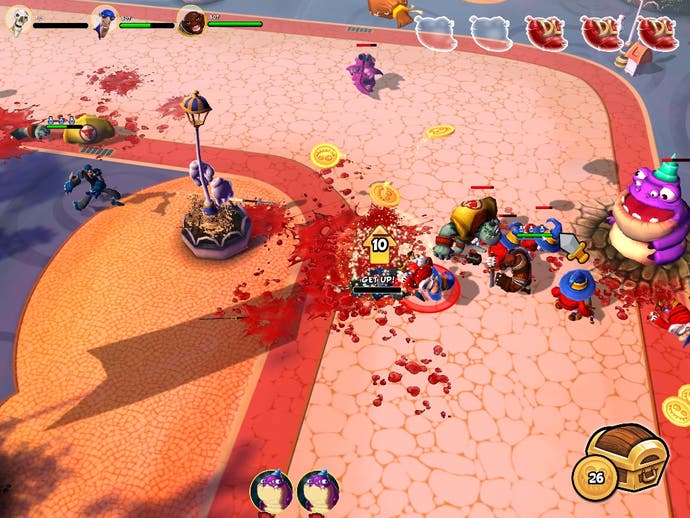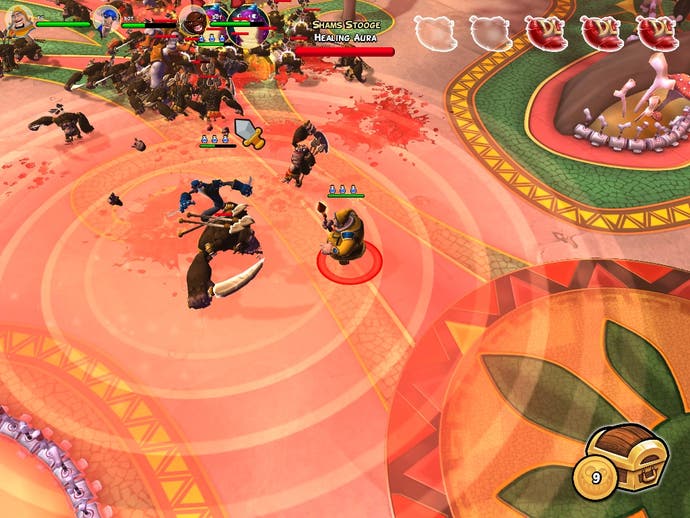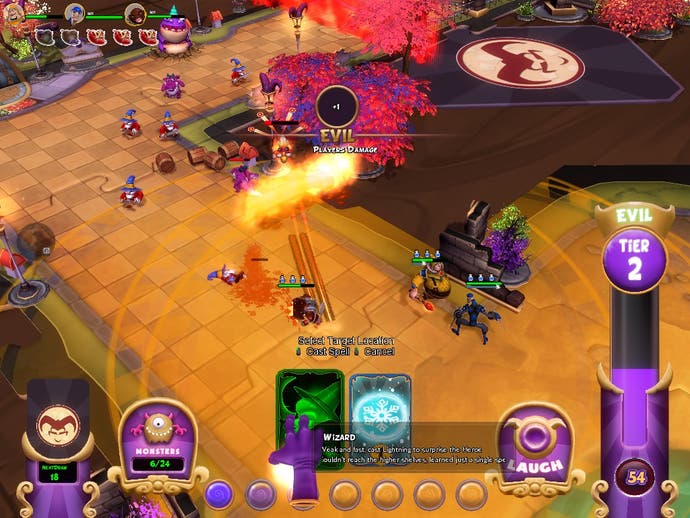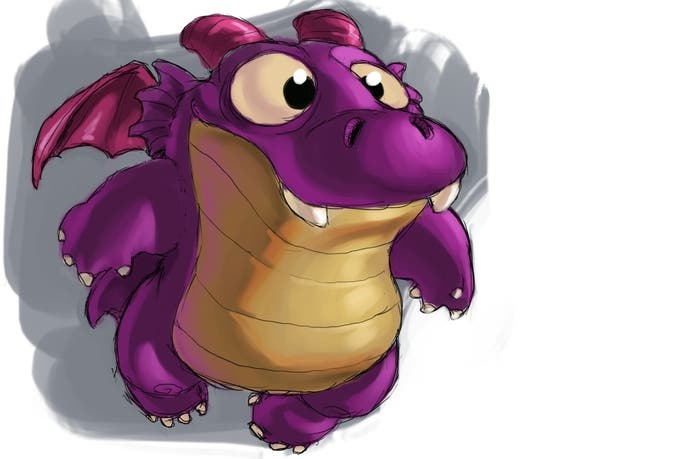Dungeonland review
Hack and slapdash?
Compact and single-minded, Dungeonland is very nearly a masterclass in sharply focused game design. There are two additional things you're going to need to get the best out of this scrappy hack-and-slasher, however. The first, weirdly enough, is a decent gamepad, as Critical Studio has somehow managed to fashion a top-down action RPG that feels cumbersome and imprecise to control with a mouse and keyboard. The second is a couple of friends: you can have a relatively good time bashing faces and looting chests with the game's rudimentary AI companions, but if you plan on getting serious - if you'd like to make it to a boss, for example - you'll need some genuine humans on your team.
With those elements taken care of, Dungeonland is free to explore a simple design brief: Gauntlet with jokes. The jokes - fairly standard riffs on silly old fantasy - aren't particularly good, sadly, but the Gauntletting is often wonderful, and you can experience it from a couple of perspectives. Where do you want to be? Down there in the heat of heroic battle, or up above the fray, as a sadistic dungeon master who calmly shuffles a deck stacked with horrors before playing them, one by one?
Either way, the game's gloriously chaotic. In the standard adventure mode, you pick a character from a tight little trio composed of mage, rogue and warrior, and together with two allies - real or AI-driven - proceed to race through various clutter-riddled battlefields, smashing up everything you come across. The game's aesthetic blends together standard D&D clichés with amusement park trappings, and the three mini-campaigns currently available offer a decent range of rickety villages and golden savannahs mixed in with gift shops, food courts, giant many-sided dice, and even the odd animatronic teacup.

Each campaign is built from two separate levels capped with a boss; in theory, the whole lot could be chewed through comfortably in a single afternoon, at least on the easiest difficulty setting. In reality, there'd be nothing comfortable about it. Dungeonland is a challenging game, even if you're playing with friends who really know what they're doing. That easiest difficulty setting I mentioned? It's called "hard". You'll die a lot as you fight your way across these relatively small stretches of candy-coloured real estate, but the joys of the game's unlock shop - along with smart smatterings of randomisation - will keep you coming back for more.
Ah, the unlock shop. Whichever character you pick, you're then faced with a pleasant range of lower-level decisions to make. Do you want your rogue to be an archer, a gunner, or an assassin, say? Then there are perks to choose, weapons and armour to buy and equip and even potion powers to select, which could mean the difference between carrying the fantasy equivalent of grenades into battle or swapping them out for the ability to drop revivifying crates of beer for your whole party to enjoy.
Mages can focus on various kinds of elemental attack and can buff specific members of the party, while Warriors can tilt themselves towards offensive or defensive options and have a decent block to call into play whenever the standard dodge move isn't enough. The weapons, perks and other bits of kit all have to be bought with in-game gold, of course, but the in-game gold flows pretty fast here, spilling from every other enemy you bludgeon and shooting out of each chest - or trash can - you open.
I love the wet pop of an exploding phoenix - in Dungeonland, they look like turkeys with a hangover

Those generous heaps of gold and jewels are your reward for clinging on during an adventure that's often ridiculously fast-paced. Dungeonland's levels are crammed with monsters, ranging from horrible buzzing bees to windmilling over-sized ducks and groups of electrical wizards. They come at you in throngs and in mobs, and while you're meant to take them down, your real objective should always be the spawners lurking behind them: the weird purple slugs that bring groups of these wretches into the world in regular instalments. Target prioritisation is a smart way of adding a little complexity to the endless onslaught of enemies, and when it's combined with gates that can only be passed through once an area's safe, as well as randomised mini-bosses who play their own tricks like slowing down movement or turning invisible, it makes for a game that's relentless without ever becoming wearisome.
Most importantly, though, Dungeonland's combat feels like a succession of little pleasures regardless of what you're up against. I love the momentum that you can build up as a rogue, flinging thousands of daggers into a crowd of nasties. I love the wet pop of an exploding phoenix - in Dungeonland, they look like turkeys with a hangover - and the fireworks that erupt when separate skills come together in combination.
Playing as dungeon master - sorry, maestro - the pace is, if anything, even more hectic. In this mode, one player chooses a load-out of monsters, traps, spells and other dark delights, and then gets to lob them at a group of three unfortunates as they march through a series of corridors and halls. There are moments of strategy to be had as you lay down the correct piece of cruelty at the perfect moment, but you can have plenty of fun just dishing out tangled strings of punishment at random in between various cool-downs, too.

Is it balanced? Not really: the odds are stacked massively in the dungeon master's favour. It's a quirk of design, perhaps, but one that, paradoxically, makes it even more fun to try and work your way through the mode from the perspective of the little guys stuck at the sharp end. There's a wonderful sense of achievement to be had braving such colourful torments, particularly when you know that the dungeon master who's causing you all this woe will meet you at the end of the gauntlet, controlling the final boss.
Design quirks abound, actually, and not all of them are quite so loveable. That shop, for example, while stocked with treats, is also a masterpiece of ambiguity that can leave you entirely unclear regarding the exact natures of many of the items you'll be spending serious change on. Defeat, meanwhile, often comes when you're, well, still alive, since your team has a shared pool of extra lives. When the last one's been used up and the next person dies, you all go with him, even if you're still standing and fighting with plenty of personal health left in the tank.
Companion bots are not quite up to the task, either, which makes this a game with a serious multiplayer bias. In adventure mode you're unlikely to get to the end of even the shortest of stages on the easiest of difficulty settings accompanied by AI pals, due to their flakiness when it comes to reviving teammates or utilising their more useful powers. Elsewhere, expect frame-rate issues, the odd show-stopping bug, graphical glitches and a multiplayer match browser that isn't much fun to work with. Critical Studio is offering a small game that's likely to get bigger with content updates - hopefully it will grow a little more stable while it's at it.
It's infuriating that the adventure feels so rough around the edges, then, but a range of annoyances are not quite enough to detract from the madcap brilliance at the core of the whole thing. Grab a few friends and Dungeonland is eccentric and thrilling in equal measure: it's affable yet demanding, and the very definition of knockabout fun.









